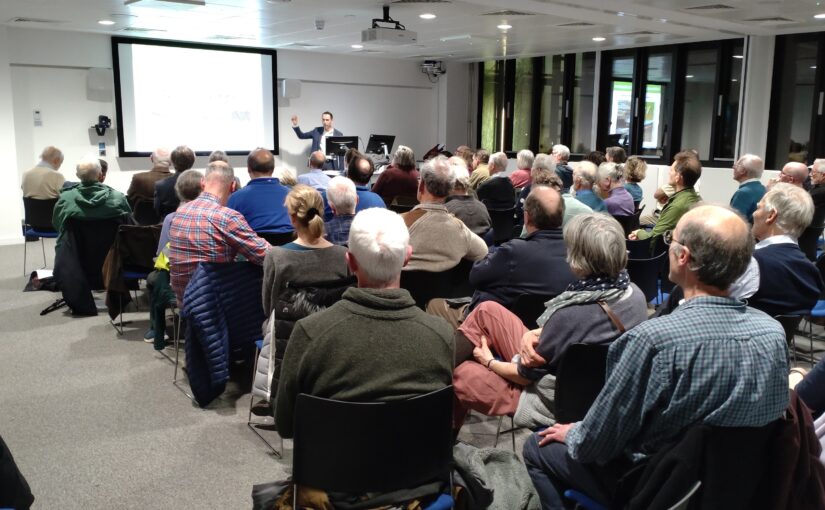At a packed AGM of the Cam Valley Forum (CVF) on 20th March, a resolution was passed by an overwhelming majority calling for a hosepipe ban to take effect from 1st July 2023. Why would the CVF want people not to use hoses in their gardens in high summer?
During hot, dry summers our water consumption in Cambridge can increase by 30%. This causes the Chalk springs and streams to dry up. The Cam becomes little more than an elongated pond, with the trickle over the weirs at Jesus Green being largely made up of the effluent discharged from upstream sewage treatment works.
Almost all the water supplied to our homes and businesses is pumped from the ground water in the Chalk strata under us. You may think that with all the rain falling in the Cambridge area recently, these aquifers should be full to the brim. Well, no. According to even the April update the Environment Agency advised that Cambridge is still officially in drought.
Cambridgeshire’s Chalk streams are rare and wonderful. When fed from water-full aquifers, they flow at constant rate and constant temperature regardless of season or rainfall. We should value and protect them as passionately as we would urge Brazil to protect its rain forests.
Significant ecological harm has already been done, and, unless rapid action is taken to reduce abstraction, the situation is going to get very much worse, exacerbated by the rapid population growth in the Cambridge area and climate change. There are proposals to transfer water from Grafham Water and to build a new reservoir near Chatteris, but it seems unlikely that new water supplies from these or any other significant sources will be available before 2032.
Abstraction of groundwater could be reduced if we were to use water more sparingly. On average Cambridge residents use around 150 litres of water per person per day, much greater than the 50 to 100 litres per person per day which the World Health Organization says should be sufficient. However the most effective way of reducing water consumption and making everyone aware of the need to save water is to impose a well-publicised hosepipe ban.
Cambridge Water have a Drought Plan that was only finalised in April 2022, however sadly this is not fit for purpose. It states that it should be necessary to introduce a hosepipe ban not more than once in 20 years. The reason behind their extraordinary complacency is that they calculate that they can meet their statutory obligation of keeping water flowing through our taps by sucking it out from deeper and deeper into our Chalk aquifers. This may be true, however they also have a responsibility towards the environment, which is what their over-abstraction is harming.
They say that implementing a Hosepipe Ban from 1st July would be a deviation from their drought plan, and that they could not do this without the agreement of the Environment Agency and DEFRA. So we asked them to start the process of getting agreements from all concerned, using the overwhelming evidence justifying it that we have provided. After a letter to the CEO, Andy Willicott, and several emails and responses from his Strategy and Regulations Director, and a zoom meeting, it is apparent that Cambridge Water Company will not willingly do this.
To understand Cambridge Water Company we should look at how it has evolved. In 1610 Hobson’s Conduit was constructed to bring Chalk spring water from Nine Wells into Cambridge. In 1853 Royal Assent was granted to a ‘good honest company formed to supply the town with water’. This was the origin of Cambridge Water, a once much-respected Company. To meet demand, it abstracted from the Chalk aquifer, which had been thought to have a limitless supply of pristine water. However as more and more boreholes were created it became apparent that abstraction was affecting the water table and causing Chalk springs to dry up. To counter this, in the 1980s, it was decided to pump water from the boreholes to augment the springs that had been harmed. This further reduced the level of the water table. In 1990 the water industry was privatised and Cambridge Water was then bought and sold four times before becoming part of South Staffordshire Water PLC, which is based in Walsall, and is a subsidiary of SSW Finance Ltd.
Inevitably SWW Finance’s key objective is to make money to fund, amongst other things, shareholders’ dividends and bonuses for senior executives. The more mains water supplied the more money is made. So, is our natural environment a victim of greedonomics? CVF would hope not, and we are actively engaging with Cambridge Water Company regarding their Water Resources Management Plan (WRMP), which is currently out for consultation. They have now agreed to re-appraise the triggers for action on droughts, and to try to reduce the delay between the trigger being activated and action being taken. This would seem to indicate that they take their responsibility for the environment seriously. They have engaged the management consultants Skewb Ltd to prepare a five-year plan for reducing water consumption. However, the measures that are being proposed are most unlikely to keep pace with increasing demand due the area’s growth, or slow down the environmental damage that is being caused. Cambridge Water need to wake-up to the climate emergency that the City Council declared in 2019.
Gentle persuasion to reduce water consumption has too limited an effect. Sadly, high-summer hosepipe bans will be needed if Cambridge Water is to begin to stem the deterioration of our precious Chalk spring fed streams between now and when reservoirs may start replacing boreholes. We will also need to use water much more sparingly.
Michael Goodhart for Cam Valley Forum.

